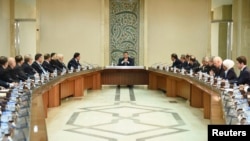Reports of dissension inside the regime of Syrian President Bashar al-Assad are on the rise, amid reports of the downfall of the country's top intelligence chief, Ali Mamlouk. Mamlouk's reported arrest comes just weeks after the death of Rustom Ghazaleh, another top spy chief, in a Damascus hospital.
Arab media reported Monday that one of Syria's top intelligence chiefs, Ali Mamlouk, may have been arrested for allegedly plotting to topple the regime of President Bashar al-Assad. Britain's The Daily Telegraph newspaper began the speculation in an article suggesting that Mamlouk was angry over the regime's increasingly strong ties with Iran.
A Kuwaiti newspaper reported nearly two weeks ago that Mamlouk had been poisoned, while a top Iranian commentator said that he was “sick.” Other Arab media claimed that Mamlouk was under arrest for speaking with Turkish intelligence officials.
Another veteran Syrian spy chief, Rustom Ghazaleh, died under mysterious circumstances in a Damascus hospital last month. Ghazaleh reportedly clashed with other top intelligence officials over military operations along the southern front near Daraa.
Both Mamlouk and Ghazaleh were accused of involvement in the 2005 assassination of former Lebanese prime minister Rafiq Hariri. A third Syrian intelligence chief with alleged ties to the assassination, Jameh Jameh, died of gunshot wounds near his home in 2013.
Khattar Abou Diab, who teaches political science at the University of Paris, tells VOA that the Syrian regime has a long history of getting rid of officials who have become a political burden.
He says that given the unusual deaths of other Syrian intelligence officials like former interior minister Ghazi Kenaan, and Assad's brother-in-law and intelligence chief Assef Shawqat, one gets the impression that various figures in the Syrian regime are periodically “liquidated,” either by inside or outside forces.
Veteran Lebanese politician Walid Jumblatt recently testified before the United Nations tribunal investigating the death of Hariri that Syrian intelligence officials were involved in plotting the bomb blast that killed him in 2005. Jumblatt also accused Syrian officials of killing other Lebanese leaders, including his own father.
'Unlikely' coup plotter
Abou Diab says the “coup” accusation against Ali Mamlouk is “unlikely” since he has “no men on the ground to carry out a putsch.” He points out, however, that some Assad loyalists, including his Iranian advisers, may have been upset by allegations that Mamlouk historically had channels to certain Western spy agencies.
Syria expert Joshua Landis, who heads the Middle East Studies Center at the University of Oklahoma, says he believes that accusations of a “coup” attempt by Ali Mamlouk, as well as trying to negotiate with the Syrian opposition or friction over ties with Iran, are not plausible:
“Off the cuff, the allegations seem far-fetched. What would Ali Mamlouk be doing talking to the opposition? The only way the opposition wants to see or talk to Ali Mamlouk is dead. And who is he going to talk to in the opposition because the opposition is hundreds of different militias,” says he.
Landis also says allegations that Mamlouk had second thoughts about support from Iran were “ludicrous.”
“Where else would Syria get support?... They've been getting support from Iran for four years, and it's the only way [the regime] is going to survive,” says Landis, adding that the “narrative of Sunni-Shi'ite friction inside the regime” is “too neat.”
Former U.S. diplomat Richard Murphy tells VOA that he is “not surprised by rumors of coup plotting” inside the regime, since the “Syrian power structure has been under enormous pressure as the conflict drags on,” and that “this could be a sign that the cracks are widening.”




